Egypt: Is Isaiah 19:1-17 a Prophecy in Process?
on Monday, April 7, 2025 by Bill SalusAccording to several unfulfilled biblical prophecies, Egypt is en route to becoming the lowliest nation on earth. The day approaches when they will no longer say, “As goes Egypt, so goes the Middle East.”
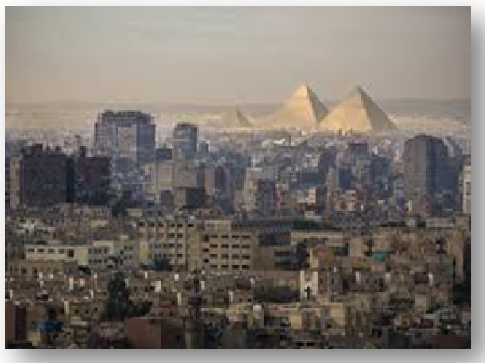
“It (Egypt) shall be the lowliest of kingdoms; it shall never again exalt itself above the nations, for I will diminish them so that they will not rule over the nations anymore.” (Ezekiel 29:15, NKJV; emphasis added)
This extreme drop in national ranking finds fulfillment in the Millennium, but the process appears to already be underway. This article will explore the proclamation against Egypt in Isaiah 19:1-18, which starts Egypt’s dramatic spiral downward.
You can read my complete verse by verse commentary on this subject in the article entitled, “Isaiah 19:1-18 Commentary on the Future of Egypt.” This present study serves as an enhancement and update to that composition. It goes into greater detail to illustrate how Isaiah 19:1-18 could be a prophecy unfolding detail by detail before our very eyes.
Through a sequence of significant events described in Isaiah 19:1-15, Egypt finds itself going toe-to-toe in a terrifying confrontation with Israel. This article will help show that this final conflict was not fulfilled in the wars between Egypt and Israel in 1948, 1967 or 1973.
“In that day Egypt will be like women, and will be afraid and fear because of the waving of the hand of the Lord of hosts, which He waves over it. And the land of Judah (in Israel) will be a terror to Egypt; everyone who makes mention of it will be afraid in himself, because of the counsel of the Lord of hosts which He has determined against it.” (Isaiah 19:16-17, NKJV; emphasis added)
Presently, Egypt and Israel are struggling to hold on to the fragile peace treaty that was put in place in 1979. However as the above passage points out, this agreement will become void because, “The Lord of hosts…has determined…the land of Judah will be a terror to Egypt.”
But why? What series of events provokes The Lord of hosts, Who doesn’t execute judgments randomly, to make such a devastating determination? Before answering this question let’s look at a few recent inflammatory Egyptian events causing concern in Israel.
“Egypt is threatening to void its decades-old peace treaty with Israel. What does that mean?” (AP –2/12/24)
“‘Egypt ‘preparing for another Yom Kippur War,’ warns Israeli media site” (Middle East Monitor – 7/16/24)
“Israeli media have raised concerns about the increasing strength of Egypt’s air defense forces, citing their possession of highly advanced weaponry, mostly of Russian origin, as well as domestically produced arms. One website has even warned that Egypt is “preparing for another Yom Kippur War,” a reference to what Egyptians call the 1973 October War.”
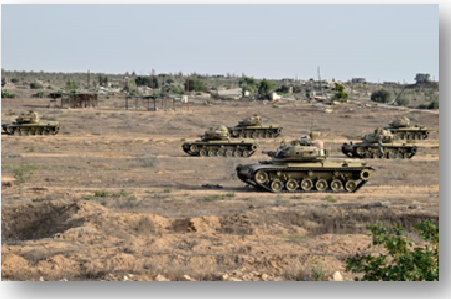
“Egypt military buildup in Sinai threatens peace with Israel, source warns” (Jerusalem Post – 3/31/25)
“Friend or foe? Egypt’s $5 billion arms buildup and the question no one’s asking” (Allisraelnews – 12/29/24)
“Egypt has been engaged in one of the most aggressive military modernization and expansion programs in its history. Under President Abdel Fattah Al-Sisi’s leadership, the Egyptian armed forces have been transformed into one of the world’s most formidable forces, with recent acquisitions including everything from aircraft carriers to advanced fighter jets, from German submarines to the latest American tanks.
This buildup has accelerated dramatically in the past decade, with Egypt recently securing another massive $5 billion arms deal with the United States. Sometimes the simplest questions are the most revealing: Why is Egypt pursuing such extensive militarization while struggling with severe economic challenges?
Recent evidence reveals that Egyptian military preparation is specifically oriented toward potential conflict with Israel. In military academies across Egypt, officers engage in a detailed study of Israeli military equipment vulnerabilities, with a particular focus on the Merkava Mark IV tank.”
The Sequence of Significant Events in 19:1-15
This next section identifies the sequence of significant events described in Isaiah 19:1-15 that provoke the Lord to judge Egypt. It will be followed by an exploration of the seemingly related prophetic details involving Egypt’s role described in Psalm 83 and Zechariah 12 in relationship to Isaiah 19:16-17.
1. An Egyptian Civil Uprising
“The burden against Egypt. Behold, the LORD rides on a swift cloud, And will come into Egypt; The idols of Egypt will totter at His presence, And the heart of Egypt will melt in its midst.” (Isaiah 19:1, NKJV)
The very first verse points out that Egypt’s judgment will process rapidly, likened to a cloud moving swiftly through the windy sky. Immediately, Egyptian society will be shaken by civil unrest that will ultimately burgeon into regional conflict.
“I will set Egyptians against Egyptians; Everyone will fight against his brother, And everyone against his neighbor, City against city, kingdom against kingdom.” (Isaiah 19:2, NKJV)
Interestingly, during Egypt’s 2011- 2013 uprising as an integral part of the Arab Spring, Egyptians fought against each other. Civil unrest plagued the nation as family feuds erupted and neighborhoods and cities fell into turmoil. Witnessing the events unravel, the scenario seemed to play out as predicted back in the 8th century B.C. in Isaiah 19:2.
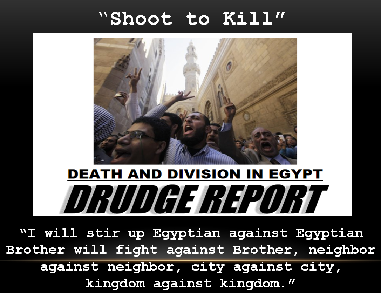
“Egypt at Risk of Civil War” (The National Interest – 8/2/13)
“The turning point came on December 5, 2012,… Thousands of civilians ended up fighting each other in the streets with stones, wooden clubs, knives, and homemade guns. The clashes left several dead and hundreds injured.
“Tahrir Square 10 years later: What happened to Egypt’s revolution?” (CBS – 1/25/21)
“Egyptians who once stood together in solidarity on Tahrir Square turned on one another, in many instances along sectarian and political lines, and there were violent clashes in the streets… The protesters were lauded as heroes, and there was a new feeling of hope in the country. Egyptians had seen that peaceful, mass-demonstration could bring about real change. Many believed the square in the heart of the capital was not just a symbol, but a tool; Tahrir Square will be always there, they thought. We all know the way to Tahrir. If we want change, we fill it again and change will come.”
It appears that the seedlings for the fulfillment of Isaiah 19 have already been planted in Tahrir Square. The protesters are currently held at bay by a military dictator named, Abdel-Fattah El-Sisi, but they understand, “we fill it again and change will come.”
Isaiah 19:2 concludes with “Kingdom (will rise) against kingdom,” which alludes to a regional conflict, namely with Israel as per Isaiah 19:16-17. This aspect of the verse is yet future, and implies that the story doesn’t end merely with civil unrest, but eventually burgeons into a regional war. Perhaps, there will only be this one uprising, but as stated above by the protestors, “all know the way to Tahrir, if we want change.” This beckons the question, “Will there be a repeat uprising?”
2. Quest for Spirituality
“The Egyptians will lose heart, and I will confuse their plans. They will plead with their idols for wisdom and call on spirits, mediums, and those who consult the spirits of the dead.” (Isaiah 19:3, NLT)
Is it possible that Isaiah 19:3 could be speaking of what is taking place in Egypt today among Muslims concerning their mystical worship of calling on and consulting spirits for wisdom and advice? Following the civil uprisings of the Arab Spring, there has been a resurgence of these spiritual behaviors, which are common practices in Sufism.
“Egypt’s millennial’s turn to Sufism” (Al-Monitor – 07/ 2018)
“REVOLUTIONARY RELIGION: YOUTH AND ISLAM IN POST-2011 EGYPT” (Data Space – 2021)
“This dissertation examines how political participation in a revolution changed the landscape of religious discourse and practice. In particular, how Muslim youth partaking in the 2011 Egyptian uprising affectively responded to the promise and ultimate demise of a revolution… They no longer trusted the religious authorities whom they believed violated the religious teachings they had preached for years prior to the uprising… These youth now believe that there are many paths to gaining God’s favor. Some of them have turned to Sufism, the mystical branch of Islam.”
Notice that there just happens to be a modern revival of interest in Sufism after the years following Egypt’s revolution. Isaiah 19:3 says, “they will plead with their idols for wisdom and call on spirits, mediums, and those who consult the spirits of the dead.” This aspect of pagan worship in Sufism is explained below from an article entitled, “Islam vs Sufism: A Comparative Analysis Of The Key Points.”
“In Sufism, it is often encouraged to invoke saints (awliya) for assistance, even if they are deceased or not physically present. This practice is based on the belief that saints possess spiritual powers and a connection to the unseen (ghaib), enabling them to intercede or assist those who seek their help. Followers are often directed to shrines or saints to resolve their problems…Followers often venerate saints’ graves and seek blessings there… It is widely believed that prophets (Ambiya) and saints (Awliya) remain in their graves just as they were in life — fully aware, interacting with people, and capable of assisting those who seek their help. It is also commonly claimed that they can come out of their graves when they choose and witness everything happening in the world.”
“New Age Sufism finds fertile ground in Egypt” (Religion Watch – Volume 35 No. 3)
“Meditation practices inspired from Sufism are gaining popularity in the Egyptian capital Cairo as people are looking for alternatives to rigid religious practices, writes Egyptian journalist Dalia Chams on the French website Orient XXI (January 9). This trend is part of a modern revival of interest in Sufism, evidenced by the phenomenal success of a book by Turkish novelist Elif Shafak, The Forty Rules of Love, that was translated into Arabic in 2013 and is reported to have sold ten million copies in Egypt.”
3. The Fierce King
“And the Egyptians I will give Into the hand of a cruel master, And a fierce king will rule over them,” Says the Lord, the Lord of hosts.” (Isaiah 19:4)
As a result of the national uprising, the Egyptians will be ruled by a dictator. Is Egyptian President Abdel Fattah Al-Sisi fulfilling this fierce king requirement presently? Below is an interesting quote from Wikipedia.
“On 8 June 2014, Abdel Fatah el-Sisi was officially sworn in as Egypt’s new president. In April 2018, El-Sisi was re-elected by landslide in election with no real opposition. Under El-Sisi Egypt is said to have returned to authoritarianism. New constitutional reforms have been implemented, meaning strengthening the role of military and limiting the political opposition.”
“Egypt President Abdul Fattah al-Sisi: Ruler with an iron grip” (BBC – 12/1/20)
“General Sisi—Egypt’s butcher president at large” (Socialist Worker – 11/3/15)
“Sisi has jailed over 40,000 people, torture is rife and 3,400 people have been killed since his regime came to power. It was Sisi who designed the so-called ‘virginity tests’ of women protesters.”
With President Abdel Fattah Al-Sisi return to authoritarianism and his strengthened military that is intentionally limiting the political opposition, he does seem to qualify as the fierce king, but only time will tell if he is. Whoever this dictator may be, while he is ruling over Egypt something catastrophic happens to the Egyptian economy.
Some teach that the fierce king in Isaiah 19:4 could have been either Psamtik I (Psammetichus I) (664-610 B.C.) or Esarhaddon (681-689 B.C.), but I dispel these views in my associated article entitled, “Has Isaiah 19:1-15 Been Fulfilled?”
4. Egypt’s Economic Collapse
As Egypt’s woes progress their entire economy collapses, starting with the drying up of rivers and streams.
“The waters of the NILE will DRY UP, and the riverbed will be PARCHED and empty. The CANALS will stink; the streams of Egypt will trickle and DRY UP; the reeds and rushes will WITHER. The bulrushes by the Nile by the mouth of the river, and all the fields sown along the Nile, will WITHER, blow away, and be no more. Then the fishermen will mourn, all who cast a hook into the Nile will lament, and those who spread nets on the waters will pine away.” (Isaiah 19:5-8, BSB; emphasis added)
Stretching over 4000 miles, the Nile river that courses through Egypt has long been recognized as the longest river in the world. This river remains an invaluable source of life for Egyptians. More than 95% of the country’s population depend on its water and live within a few miles of the river banks.
In the King James Bible, Isaiah 19:5 says … “and the river shall be wasted and dried up ” and in verse 6 … “the brooks of defense shall be emptied and dried up.” Isaiah is predicting a huge catastrophic judgment upon Egypt’s Nile River and its canals and tributaries. Such a disastrous event has never occurred in all of Egypt’s recorded history. Thus, this aspect of Egypt’s judgment is yet future.
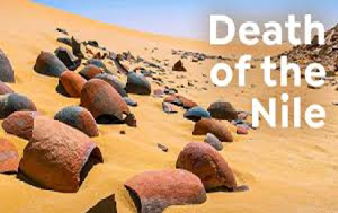
Could we be living at the threshold in time of witnessing this happen? If the significant events of Isaiah 19:1-4 are already in process, then this calamity should come next. Are we currently seeing signs of this coming?
“Nile is in mortal danger, from its source to the sea” (France 24 – 2/11/22)
“The pharaohs worshipped it as a god, the eternal bringer of life. But the clock is ticking on the Nile.”
“Is the Nile River Drying Up? One of the World’s Most Famous Rivers Is in Danger” (Green Matters – 9/29/23)
“Why Egypt’s Lifeline Is Drying Up | Nile Conflict” (The Archaeologist – 3/24/23)
“The River Nile. One of the world’s most ancient and legendary waterways, bringing life to otherwise inhospitable regions of Egypt. But the Nile is slowly dying, its tributaries and channels drying up and threatening the livelihoods of millions who depend on its nourishing waters… But a major construction project upriver is further endangering the life of the river.”
The drying up of the Nile and its canals is accompanied or followed by the downfall in other areas of Egypt’s economy, including the textile industry.
“Moreover those who work in fine flax And those who weave fine fabric will be ashamed;And its foundations will be broken. All who make wages will be troubled of soul.” (Isaiah 19:9-10)
Thus far Egypt’s economy has not reached the point that, “all who make wages will be troubled of soul,” but Sisi’s plan of prosperity for Egypt hasn’t been working.
“How Sisi Ruined Egypt” (FP – 8/9/23)
“The coup leader turned-president promised Egyptians prosperity, but the country is flat broke.”
“Egypt: The Egyptian economy remains vulnerable despite positive momentum” (BNP Paribas – 2/11/25)
If Isaiah 19:1-17 is in process, then we can anticipate a drying up of the Nile and its tributaries accompanied by a widescale economic collapse in Egypt. This point is emphasized in the next passage.
“The Lord has mingled a perverse spirit in her midst; And they have caused Egypt to err in all her work, As a drunken man staggers in his vomit. Neither will there be any work for Egypt, Which the head or tail, Palm branch or bulrush, may do.” (Isaiah 19:14-15)
The Final War Between Israel and Egypt
The reason Isaiah proclaims divine judgment upon Egypt is discovered in the next passage.
“In that day Egypt will be like women, and will be afraid and fear because of the waving of the hand of the LORD of hosts, which He waves over it. And the land of Judah will be a terror to Egypt; everyone who makes mention of it will be afraid in himself, because of the counsel of the LORD of hosts which He has determined against it.” (Isaiah 19:16-17)
“In that day” that the events of Isaiah 19:1-15 are transpiring, Egypt will face off in a final war against Israel. Egypt fought and lost against Israel in 1948, 1967 and 1973, but those conflicts were not accompanied by the details in Isaiah 19:1-15. Thus, Egypt and Israel will have another war in fulfillment of Isaiah 19:1-17.
Egypt appears to be involved in two major prophecies related to Isaiah 19:1-17. Under the banner of the Hagarenes, they show up in Psalm 83. This prophecy involves a ten-member confederacy that seeks to wipe Israel off of the map.
“They have said, Come, and let us cut them off from being a nation; that the name of Israel may be no more in remembrance. For they have consulted together with one consent: they are confederate against thee: The tabernacles of Edom, and the Ishmaelites; of Moab, and the Hagarenes.” (Psalm 83:4-6, KJV)
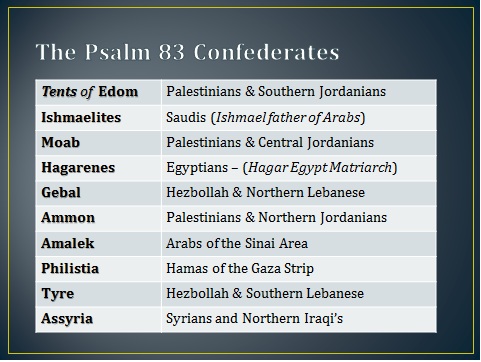
The image displays the modern-day identities of these confederating countries.
They are seemingly the same countries in Zechariah 12:2, 6. Zechariah calls them the surrounding peoples.
“Behold, I will make Jerusalem a cup of drunkenness to all the surrounding peoples, when they lay siege against Judah and Jerusalem.” (Zech. 12:2)
In a final attempt to accomplish their goal to destroy Israel, the surrounding peoples, including Egypt, will attempt a siege upon Judah and Jerusalem. This will be an unsuccessful siege and Israel will decisively defeat Egypt and the other surrounding Arab peoples of Psalm 83.
“In that day I will make the governors of Judah like a firepan in the woodpile, and like a fiery torch in the sheaves; they shall devour all the surrounding peoples on the right hand and on the left, but Jerusalem shall be inhabited again in her own place—Jerusalem.” (Zech. 12:6)
As a result of this bitter defeat by the Israeli Defense Forces, Isaiah 19:16-17 should find final fulfillment and Egypt will become one step closer to becoming the lowliest kingdom on the earth. For more information about Zechariah’s prophecy you can read my article entitled, Zechariah 12: The War Before Armageddon.
The questions to be answered, in light of all the details presented in this article, are as follows:
1. Has the Isaiah 19:1-15 process already begun?
2. Was the Egyptian civil uprising, whereby Egyptians fought amongst each other, the first phase of Egypt’s impending swift judgment?
3. Is Egyptian President Abdel Fattah Al-Sisi the fierce king of Isaiah 19:4?
4. Are the Nile River and its tributaries drying up?
5. Is Egypt’s entire economy on the verge of collapsing?
6. Is Egypt increasing its military expenditures and enhancements happening so that Egypt can defeat Israel in a final Arab-Israeli war?
If the answers to these questions turn out to be yes, then Isaiah 19:1-17, Psalm 83 and Zechariah 12:1-9 are ancient prophecies that are about to find final fulfillment.
Five cities in the land of Egypt will speak the language of Canaan
“In that day five cities in the land of Egypt will speak the language of Canaan and swear by the LORD of hosts; one will be called the City of Destruction.” (Isaiah 19:18)
Isaiah concludes Egypt’s judgment prophecy by informing that “In that day,” five cities in Egypt will speak the language of Canaan, which is Hebrew. This implies that Israel will possess five cities that are presently under Egyptian sovereignty when the prophecies spelled out in Isaiah 19:1-17 take place.
Isaiah’s use of “In that day,” seems to connect best with the preceding events of Isaiah 19:1-17, rather than the details described subsequently in Isaiah 19:19-25. Whatever may be the application, the point is that someday Israel will possess at least five cities in Egypt. According to Genesis 15:18 the Bible identifies it as the Promised Land.
“On the same day the Lord made a covenant with Abram, saying: “To your descendants I have given this land, from the river of Egypt to the great river, the River Euphrates.”
NOTE: Some teach that Isaiah 19:1-15 has already been fulfilled. There is no historical evidence that comprehensively supports this teaching. To learn more about why Isaiah 19:1-17 has not been fulfilled, but is still a future prophecy, you can read my afore mentioned article entitled, “Has Isaiah 19:1-15 Been Fulfilled?”
__________________________________________________________________________
CLICK HERE TO ORDER A COPY OF THE FUTURE WAR PROPHECIES BOOK FOR $17.95 + S & H
CLICK HERE TO ORDER THE FUTURE WAR PROPHECIES DVD (2-MESSAGES) FOR $17.95 + S & H
CLICK HERE TO ORDER THE FUTURE WAR PROPHECIES DVD (2-MESSAGES) & THE BOOK FOR $33.95 + S & H
WATCH THE BOOK & DVD TRAILER BELOW.


